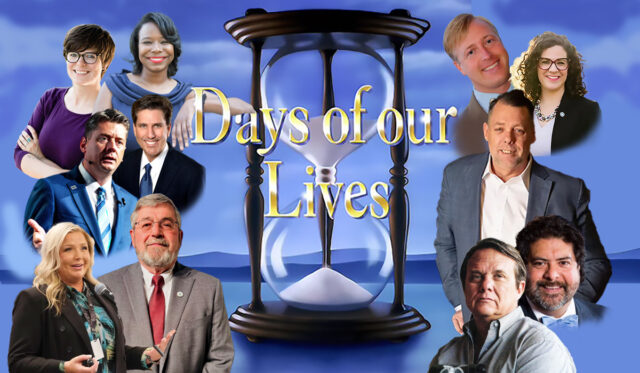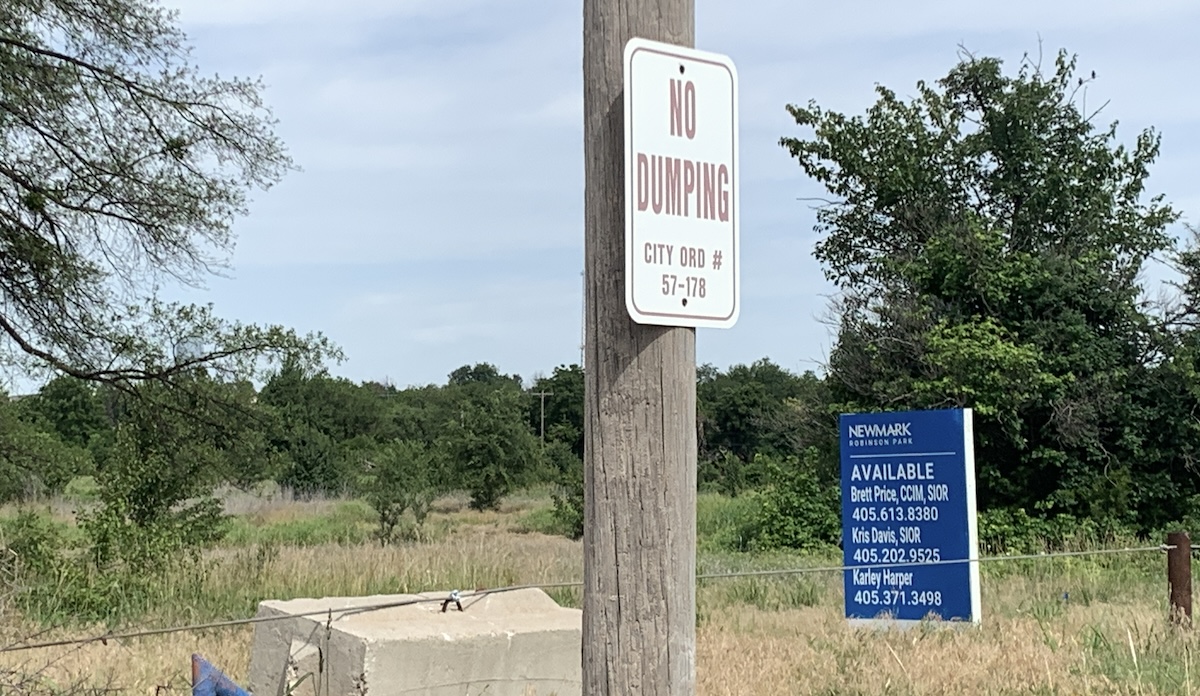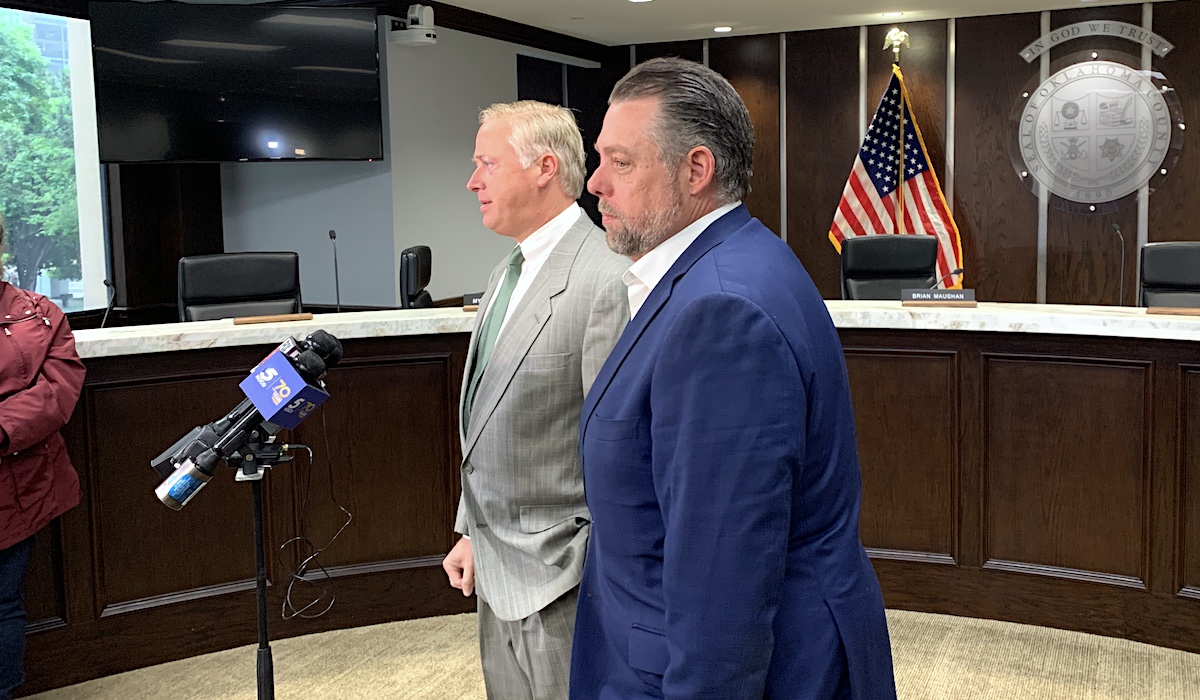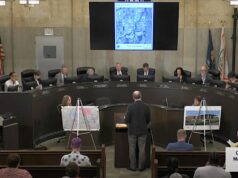

Oklahoma County lacks enough money to build the new jail voters approved two years ago, and it’s not even close. On another front, the county is throwing concern about optics aside in an effort to squash the City of Oklahoma City in court, claiming that constitutional sovereignty means a failed municipal zoning vote should not impede the jail’s construction. Meanwhile, Del City residents are circulating a petition to impanel a grand jury to investigate allegations of corruption against District 3 Commissioner Myles Davidson for his role in selecting the proposed new jail site.
Like sands through the hourglass, these are the days of Oklahoma County lives.
Asked about the soap opera saga, one member of the county’s Citizens Bond Oversight Advisory Board called the jail dilemma “a generational hot potato that no one wants but someone has to solve.”
“Lives are truly at stake based on the sins of the past,” said community developer Sandino Thompson. “The state drives the policy that fills the criminal justice system. The city drives the majority of the demand for the jail. The county is the child who is stuck figuring out how to bury a parent because they have to and no one else really wants to help. The problem has to get fixed, and the clock — unfortunately — is ticking.
“I don’t like the solutions, but I hate the consequences of inaction even more.”
Oklahoma City vs. Oklahoma County: Round 2, fight

In matrimonial metaphors, Oklahoma County and Oklahoma City are wed together when it comes to detaining those accused of crimes in the OKC metro. Compared to most major municipalities around the country, the City of Oklahoma City has no jail of its own and foots a relatively minor portion of detention costs.
Instead, the county owns and operates the facility, although its own lack of a dedicated sales tax to support safe operations has become a common critique, particularly as the Oklahoma County Jail at 201 N. Shartel Ave. fell into disrepair, saw a rash of detainee deaths and drew threats of takeover from the federal government.
With a $260 million bond package approved by county voters in 2022 by a wide margin, the new jail is supposed to solve a lot of the problems created at the current one, a decrepit 13-story facility that saw immediate issues when it opened more than 30 years ago. Experts and oversight boards have said that limiting the new jail to only one or two stories will stem some of the county’s operational problems. A planned mental health diversion facility is also expected to help, but those developments will expand the ultimate geographical footprint.
For two years, the Board of County Commissioners’ hunt for a proper property has been difficult and dramatic. A proposed location near Will Rogers World Airport was axed by federal aviation authorities, and no neighborhood wants the new jail nearby.
Nonetheless, in February, two of the three county commissioners approved moving forward with a 71-acre property at 1901 E. Grand Blvd., just west of Del City’s municipal boundary in southeast OKC. While Del City leaders asked attorneys whether they had standing to block the new jail by lawsuit, the OKC Planning Commission advanced the request in an odd April meeting that included two votes and many reservations about ancillary issues.
But when the rezoning request worked its way to the OKC City Council on May 21, members voted 7-1 against it, with only Mayor David Holt in favor. Ward 8 Councilman Mark Stonecipher opted out, citing conflicts of interest involving his law firm.
While some thought that vote knocked the Grand Boulevard site off the table, the county moved forward and purchased the property June 10 and filed litigation eight days later asking an Oklahoma County District Court judge to enter an order prohibiting the city from enforcing any zoning ordinance or special permit denial that would “delay, block or prevent the BOCC from fulfilling its constitutional duty to provide the citizens of Oklahoma County with a county jail facility and secured mental health facility” at the site.
Underscoring the soap-operatic situation, the petition for judicial review from Oklahoma County District Attorney Vicki Behenna’s office opens by quoting George Washington and making a sexy suggestion.
“As George Washington once said in an address to Congress, ‘arbitrary power is most easily established on the ruins of liberty abused to licentiousness.’ The city’s words and actions throughout the jail site selection process have been licentious,” the petition states. “The city has not only broken its long-standing commitment to contract and pay for jail services but has failed to apply its own zoning and special use permit standards correctly and fairly.”
The enmity between the two governments is further illustrated by a Peanuts reference in the county’s petition.
“This litigation is a result of the city’s deteriorating respect for the county’s governmental authority and the inability for the city to recognize the limitations of its own authority,” the petition states. “On at least two occasions, the BOCC has selected a proposed jail site that the city officials and staff appeared to support only for the city’s voting boards to swoop in at the last moment like the cartoon character Lucy and pull the proverbial football out from under the county.”
The petition also includes financial allegations with major implications in their own right.
“To add insult to injury, the city has, in bad faith, refused to pay for any municipal costs at the Oklahoma County Detention Center for the entire last fiscal year,” the petition alleges. “The city’s nonpayment has significantly strained the county’s existing jail system because the city’s municipal inmate housing has averaged $1.1 million per year between fiscal years 2017-2020.”
In the petition, the county argues that it has a statutory obligation to provide jail services and notes that the city does not currently operate a jail, leaving Oklahoma County as the sole provider of jail services for OKC.
“The City Council did not base its decision upon its adopted planning policies, the basic physical facts of the property, and use of surrounding area, nor any other legitimate land use consideration required to be considered by the city ordinance and existing case law,” Behenna wrote. “Instead, it is evident that the City Council considered political factors beyond the scope of their zoning power and denied the special use permit application merely because many protesters opposed the application and the site selection process employed by Oklahoma County.”
Asked about the petition for judicial review, District 2 Commissioner Brian Maughan said asserting county sovereignty and creating a court battle “wasn’t my preferred tact.”
“But with the city not giving us many choices, we went to the Grand site,” Maughan said. “I’d stress again, not because it was the first preference for me but because we were led to believe that’s where the city would zone after they had already offered the airport and then withdrew that offer. And so, it seems to be that no matter where we go, we’re going to have to put up with this fight.”
While a defendant typically has 20 days from service to answer a petition in litigation, the City of OKC had not done so by the publication of this article, although the case’s docket does not show a certificate of service. Similarly, there has been no public response from the city.
However, Ward 7 Councilwoman Nikki Nice — who will be departing the City Council after her June 18 election to the Oklahoma State Senate — said the county has not been transparent in its approach.
“I’m very disappointed,” Nice said of the court case. “Our city spoke, and our community has spoken that we want the jail to remain where it is and, unfortunately, they have not followed. I think these conversations should have been up-front and transparent. I don’t think that site is the right location. I don’t know what to say about them going forward with this. I think the most important thing to understand is that if the jail is put there, people who are arrested and people who are released are going to be far away from services. If we’re going to talk about criminal justice reform, I don’t see that reflected in this decision.”
District 3 Commissioner Myles Davidson said the county would face opposition no matter what site it selects.
“Time and time again, it has come back as the best site when you look at all of the metrics we have available,” Davidson said of the Grand Boulevard location. “We’ve had consultants, multiple groups of people, who all say it is the best site.”
Davidson said he sees little chance of winning over those opposed to the Grand Boulevard site, which years ago contained public housing that was demolished.
“They’re blinded by it, they’re upset with it,” he said. “It doesn’t matter where we go, someone is going to be upset about it. People get upset about Walmart being in their backyard until they go and shop there every day. I’m not saying a jail is like Walmart, but it’s just one of those things. They got rid of those apartments that were there, and I guess they just assumed it was going to be a blank piece of property their whole lives.”
Davidson texts released, Del Citians pursue grand jury inquiry

First elected in 2022 after serving for years as a deputy to commissioners, Davidson’s outspoken, cavalier attitude has rubbed some the wrong way during jail-site conversations, and he became the subject of controversy almost as soon as the 1901 E. Grand site was announced as a finalist.
Midwest City Councilwoman Sara Bana, a member of the People’s Council for Justice Reform and a longtime critic of the county’s jail administration, filed an ethics complaint against Davidson for his failure to file campaign finance reports.
While Davidson submitted the missing filings, he has a new problem to contend with in the form of a citizen-led grand jury petition calling for an investigation into Davidson’s actions during the jail-site selection process. The filing to start the petition was signed by Del City Mayor Floyd Eason, Rep. Andy Fugate (D-Del City) and Gina Standridge, a Mid-Del Public Schools Board member. All three have spoken at county commissioner meetings opposing the site.
With the 45-day clock now running for organizers to obtain valid signatures from 5,000 registered Oklahoma County voters, the petition alleges corruption on behalf of Davidson, who did not respond to requests for comment about the allegations.
Some of the grand jury petition’s allegations stem from campaign donations to Davidson made by a former owner of the Grand Boulevard property that the county has now purchased. William Garrett, of Garrett and Company Resources, made donations totaling $2,900 to Davidson’s 2022 commissioner campaign. Davidson has called Garrett a longtime family friend.
“I have known the Garretts for over 30 years, long before I got into politics,” Davidson told KFOR in February. “Pat Garrett Jr. is actually a great friend of mine and has been for a very, very, very long time. I’ve known him longer than I’ve actually known my wife.”
The county purchased the land for about $5.4 million. The company had purchased the property in 2017 for $1.4 million.
Other claims contained in the petition include alleged failure to comply with the Open Records Act and a general criticism of showing “little regard for the moral and ethical integrity of his office” that has “developed a culture of mistrust” and “leads many to believe there is corruption of his public office.”
Standridge told NonDoc she filed an open records request earlier this year for documents relating to the sale of the Grand Boulevard property. She said she received about 20 text messages between Davidson and Xavier Neira, a business development consultant whom Davidson appointed to the Citizens Bond Oversight Committee, which was charged with recommending a short list of sites for the new jail to county commissioners.
While Davidson does not discuss donors in the released text messages, he and Neira actively discuss how they can outflank the City of OKC and secure the site they want for the jail. They also discuss conversations with leaders of Crooked Oak Public Schools about possibly moving the district’s football stadium to accommodate the jail site.
In a response to a text from Davidson requesting an update on Crooked Oak — a district whose location near the proposed jail site has drawn significant concern — Neira wrote in a March 5 text that the superintendent “feels good about the future.”
“Need a proposal to have county engineer negotiate land acquisitions and negotiate terms with various land owners,” Neira wrote, responding further after Davidson asked how that would work. “You authorize him to negotiate with Billy, Jeff and district through the real estate group and work out all details in preparation for acceptance vote of transactions, not necessarily terms.”
In what appears to be an April exchange, Neira tells Davidson he was “talking to federally approved funding source tomorrow about funding the entire county jail.”
“We may be able to tell the city to fry themselves,” Neira wrote.
Davidson responded: “Uh, yes!!!!”
Neira and Davidson had already discussed the idea of pressing the county sovereignty issue to override any city zoning votes.
“Let’s get ready to file for sovereignty as soon as re-zoning is filed,” Neira wrote March 14. “Council seems to think it helps them to go that route. So they will not worry too much about pushing to help us.”
Davidson said they needed “to get Maughan on board” and that “there’s also a [district attorney] ruling rumored to be coming out.”
“He said it was ‘stupid to have government to sue government,'” Neira wrote back. “I don’t think he budges. Did (Commissioner) Carrie (Blumert) change her mind?”
Davidson replied: “Evidently he has changed his tune.”
Neira did not respond to phone and text messages requesting comment on the exchanges with Davidson.
Last month, Davidson acknowledged the text message exchanges were his. He said communication with appointees is part of how commissioners do their job.
“I talk to appointees on a regular basis, so I know their feelings and they know mine,” Davidson said. “I’m one vote on a commission of three. I can’t make any deals with anyone. These are ideas I present to not only my board appointee but the board here as well.”
Follow @NonDocMedia on:
Facebook | X | Text or Email
‘The county is on course to run out of money’

County voters overwhelmingly approved a $260 million bond package to construct the jail in June 2022. But the price tag of the facility has ballooned since then to more than $600 million.
The county doesn’t have the funds to complete the project at the moment. In a June 25 meeting Citizens Bond Oversight Committee members and Oklahoma County engineer Stacey Trumbo concluded the county only has enough money to build a facility of about 600 beds right now, well short of the 1,800 intended for the new jail.
The gigantic funding gap is one reason why commissioners have opened the door for pursuing a public-private partnership to help finance the new jail’s construction, Davidson said. Unlike every other county in the state, Oklahoma County does not have a sales tax, which limits its flexibility in financing some projects and operating them once they are built.
Sub-plot: Inspections
The Oklahoma County Jail has failed nine straight inspections from the State Department of Health.
On June 25, jail leaders cited insufficient staffing during the unannounced visit to turn away OSDH officials.
After a repeat July 9, Assistant DA Aaron Etherington wrote to OSDH saying the department “had exceeded its lawful authority in attempting to conduct the unannounced inspection.”
“What we’re doing is what they call a P3 public-private partnership,” Davidson said. “We don’t have the money to fully fund the jail. I don’t think we could go in front of the public and ask them for more money. I don’t think that they would support it right now. So we need to do something through a public-private partnership to where we can actually construct the jail this county needs, not what we can afford at this point. Now, that doesn’t actually raise taxes or anything of the sort. It’s basically like taking out a loan, and we’ll just pay it off over the next 30 years.”
Davidson, who was not an elected official when the Board of County Commissioners set the $260 million bond election, said the potentially $400 million financing gap partially stems from commissioners not asking the public to authorize a large enough bond package.
“We didn’t know what our project was. We didn’t know what our project scope was,” Davidson said. “The reason that number was used was because that was the maximum amount of money you could get without raising taxes. And that was what the board wanted to do at the time, and that’s what they did. So, I live under what that previous board decided, and I’m looking for ways to fully fund the jail.”
Davidson said public-private partnerships are legal and “done all over the country.”
Maughan said he has concerns beyond what kind of funding sources will be used to make up the gap.
“I know that we also would have to secure some operational funding for the jail regardless of how we find out how to build it,” he said. “Eventually, the county is on course to run out of money, and we are not able to keep up with the overhead as it is. We’re the only county in the state that doesn’t have a sales tax. And to me, that’s the next conversation — how to fund the operations. But you have got to build it first.”
Steve Mason chairs the Citizen Bond Oversight Committee and has been a longtime OKC developer. Mason said one of the reasons the new jail’s construction costs have soared is because of inflation.
“COVID began in March 2020, so in four years we’ve seen about 45 percent inflation,” Mason said. “If we take the $300 million that the voters were told about when we voted on this two years ago, that gets us to about $450 million. When that original number was created several years ago, it was probably three years old. The level of details and amenities we are discussing today probably weren’t in there.”
Mason said the county is attempting to build a more humane facility, which he said has been part of a trend in jail construction over the last decade.
“As we heard from the architect (…) this is — as American jails go — a kinder, gentler facility,” Mason said. “And again, I’m going to guess that three years ago some of these thoughts weren’t there. I would suggest there’s been project scope creep as far as what will be there — from the counseling rooms to the courtrooms — that may not have been there several years ago.”
Mason said he understands why some county residents might be upset after being sold a $300 million jail by county officials and the Greater Oklahoma City Chamber of Commerce two years ago.
“I would expect some of our citizens will go, ‘Well, you told us $300 million when we voted for the bond two years ago this summer, how did it go up so much?’ And that’s a reasonable question,” Mason said. “Why has the cost of groceries gone up? I own a barbecue restaurant, and a rib dinner is $19, and that seems crazy to me. I feel guilty about charging that, but what we’re all spending on anything compared to several years ago is just ridiculous.”
‘They are rolling the dice on this thing’

While a public-private partnership to construct the jail might seem like business as usual in a city where the largest public school district just struck an bond partnership to manage $500 million in lease-purchase arrangements, it raises red flags with activists who have long worried a new jail might be a privatized jail.
The Peoples Council for Justice Reform has filed multiple open records requests related to the proposal, and its members routinely speak at BOCC meetings. The group also facilitated interviews between former detainees and their families and the U.S. Department of Justice, which has had its eye on the jail since at least 2008.
Mark Faulk, a member of the People’s Council for Justice Reform, and others in the group have called for the DOJ to take over the facility, citing a spate of deaths under the watch of former administrator Greg Williams. Detainee deaths have declined in recent years, but they remain persistent problem as the jail continues to fail State Department of Health inspections.
Faulk said he “wasn’t at all surprised” to read the texts between Davidson and Neira regarding the new jail’s development behind the scenes.
“But it was the first time that we had actual confirmation of what we knew was going to happen,” Faulk said. “Maughan said about two or three weeks again that he was bringing in an investment trust. As soon as he said that, I knew that they were moving toward privatizing the new jail. The only thing about it that surprised me was how cavalier they were in discussing it.”
Faulk said any agreement to privatize parts of the new jail will bring a host of problems.
“I think it’s a negative and dangerous thing to privatize our prison system, and we finally have the [Department of Corrections] in this state finally moving away from that, as is the federal government,” Faulk said. “But counties are moving forward with it, and I don’t see how that is anything but negative given the track record.”
Davidson said it is not his intent to privatize the Oklahoma County Jail.
“There will be no privatization of the jail,” Davidson said. “None. Zero. They’re spinning. They’re doing everything they can. It will not be a private jail. Period.”
While the Del City grand jury petition against Davidson is unlikely to directly affect the new jail’s construction, if the county were to lose the case it filed against the City of OKC, it would likely mean starting back at square one.
County officials seem confident the court will decide in their favor.
Speaking at the June 25 Citizens Bond Oversight Committee meeting, Trumbo — the county’s engineer — said the county is virtually assured of winning its case.
“We have filed a lawsuit against the city challenging their zoning ruling on that land,” Trumbo told board members. “It was filed a week ago, and they’ve got about three weeks to answer. I don’t know what their answer will be. I think it’s a pretty good brief. It’s solid. It’s got all the facts in it. I’d be hard-pressed to think we would lose that case, but what do I know?”
Faulk, on the other hand, sees the litigation as a reckless gamble emblematic of problems he has watched in county government for decades.
“They are rolling the dice on this thing,” Faulk said. “If you can’t build a jail there, it’s zoned heavy industrial, then you can’t build a mental health facility there. And now they’re going to pull out the sovereignty issue. Del City will probably sue them, and I wouldn’t be surprised if OKC did, too. So, if they lose, they will end up with a $5 million piece of land which they don’t need if they can’t push it through.”
Read Oklahoma County’s filing against OKC
 Loading...
Loading...
Read the grand jury petition against Myles Davidson
